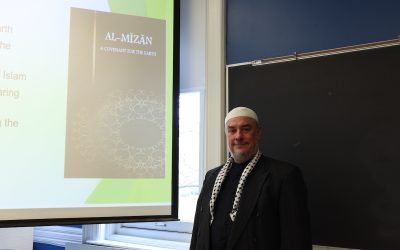Follow your Curiosity
How does religion make and remake the world?
This is one of the most urgent questions of our time—and a complicated one with no easy answers. For those ready to tackle it, the Master of Arts in Religion (MAR) degree invites you to study the world as it is shaped by religious inheritances, ideas, passions and ways of life.
The MAR is for:
- Those preparing for doctoral studies
- Professionals seeking to develop subject credentials for fields including education, administration, journalism or librarianship
- People in a variety of vocations who want to follow their curiosity about the big questions of meaning, values and the world
MAR students pursue specialized study in a field or more broadly in Theological Studies. Because the real world is not divided according to academic disciplines, MAR students can also self-declare an interdisciplinary area that combines courses in Drew’s signature interdisciplinary fields.
Program of study: Disciplinary depth. Transdisciplinary breadth.
Master of Arts in Religion coursework consists of 43 credits of disciplinary and transdisciplinary study, the development of effective research and communication skills and specialized capstone experiences.
1. Required Courses (7 credits)
- Studying Religion and Theology
- Research Methods in a Digital Age
- Critical Pedagogy and Religion
- Public Writing and Media Communication
- One interdisciplinary seminar
2. Area of Study (15 credits)
MAR students choose one area from the following five:
General Studies (MARG)
Pursue general study across several subject areas in the regular Theological School curriculum.
Bible and Cultures (BICU)
Explore the Bible’s rhetoric, material and political contexts, interpretation, and ethics within diverse cultures and theoretical frameworks.
Theology and Philosophy (THPH)
Study philosophical, constructive, pluralist, comparative, and systematic approaches to theology and theological themes.
Religion and Society (RESO)
Examine the role of religion and Christianities in relation to social processes and meaning, structures of oppression, and struggles for liberation and wholeness for individuals, communities, and the natural environment.
Self-Declared Interdisciplinary (MARI)
MAR Students may choose between either:
- Africana and African American Religion and Culture (AFAM): Study the histories, cultures, religions, philosophies, aspirations, and achievements of African Americans and peoples of African descent in regions of the world that share a history of specific kinds of colonialism.
- Ecology and Religion (ECO): Study the historical, philosophical, socio-political, and theological influences that have shaped the current planetary context and the array of contemporary global religious ecological voices and emerging eco-theologies.
- Women’s and Gender Studies (WSTT): Examine the diversity of women’s experiences as they are informed by gender, class, race/ethnicity, sexuality, age, ability, social location, and cultural and national identity. Engage theoretical and methodological insights of feminist thought and gender and queer scholarship.
3. Electives (15-21 credits)
4. Capstone (0-6 credits)
MAR students complete a capstone that demonstrates their learning in the degree. There are two tracks: Thesis Track (6 credits) or Non-thesis Track (0-3) credits.
5. Optional Concentrations
An optional concentration may be added to the degree by completing nine credits in any of the areas of study listed above (including the interdisciplinary areas) or by completing courses in the Caspersen School of Graduate Studies for concentrations in Liberal Studies or Teaching and Learning.


